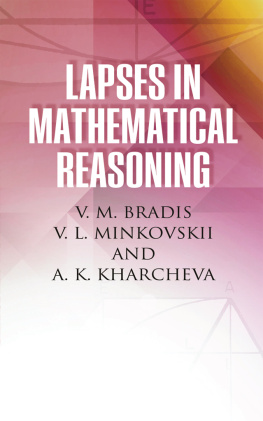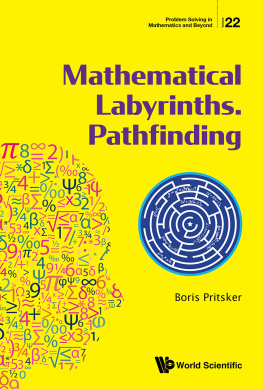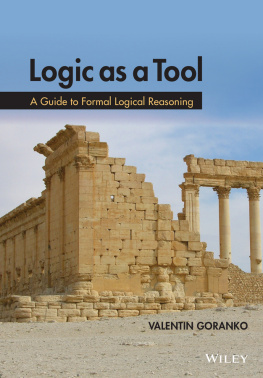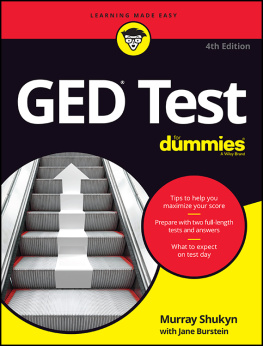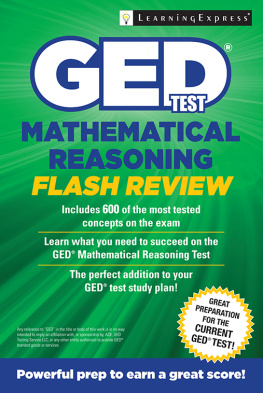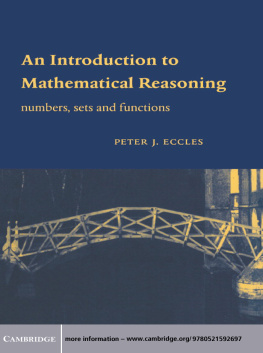V. M. Bradis - Lapses in Mathematical Reasoning
Here you can read online V. M. Bradis - Lapses in Mathematical Reasoning full text of the book (entire story) in english for free. Download pdf and epub, get meaning, cover and reviews about this ebook. year: 2016, publisher: Dover Publications, genre: Children. Description of the work, (preface) as well as reviews are available. Best literature library LitArk.com created for fans of good reading and offers a wide selection of genres:
Romance novel
Science fiction
Adventure
Detective
Science
History
Home and family
Prose
Art
Politics
Computer
Non-fiction
Religion
Business
Children
Humor
Choose a favorite category and find really read worthwhile books. Enjoy immersion in the world of imagination, feel the emotions of the characters or learn something new for yourself, make an fascinating discovery.
- Book:Lapses in Mathematical Reasoning
- Author:
- Publisher:Dover Publications
- Genre:
- Year:2016
- Rating:5 / 5
- Favourites:Add to favourites
- Your mark:
- 100
- 1
- 2
- 3
- 4
- 5
Lapses in Mathematical Reasoning: summary, description and annotation
We offer to read an annotation, description, summary or preface (depends on what the author of the book "Lapses in Mathematical Reasoning" wrote himself). If you haven't found the necessary information about the book — write in the comments, we will try to find it.
Lapses in Mathematical Reasoning — read online for free the complete book (whole text) full work
Below is the text of the book, divided by pages. System saving the place of the last page read, allows you to conveniently read the book "Lapses in Mathematical Reasoning" online for free, without having to search again every time where you left off. Put a bookmark, and you can go to the page where you finished reading at any time.
Font size:
Interval:
Bookmark:
LAPSES IN MATHEMATICAL REASONING
V. M. BRADIS, V. L. MINKOVSKII and A. K. KHARCHEVA
Translated by
J. J. SCHORR-KON
English Translation Edited by
E. A. MAXWELL
DOVER PUBLICATIONS, INC.
Mineola, New York
Bibliographical Note
This Dover edition, first published in 1999 and reissued in 2016, is an unabridged and unaltered republication of the English translation of the second Russian edition (1959), as published in The Commonwealth and International Library of Science, Technology, Engineering and Liberal Studies by Pergamon Press, Oxford and London, and the Macmillan Company, New York, in 1963.
Library of Congress Cataloging-in-Publication Data
Bradis, V. M. (Vladimir Modestovich), 1890
[Oshibki v matematicheskikh rassuzhdeniiakh. English]
Lapses in mathematical reasoning / V.M. Bradis, V.L. Minkovskii, and A.K. Kharcheva; translated by J.J. Schorr-Kon ; English translation edited by E.A. Maxwell.Dover ed.
p. cm.
Originally published: Oxford : Pergamon Press ; New York : Macmillan, 1963.
Includes bibliographical references.
ISBN-13: 978-0-486-40918-4
ISBN-10: 0-486-40918-X (pbk.)
1. MathematicsProblems, exercises, etc. 2. Problem solving. I. Minkovskii, V.L. (Vladimir Lvovich) II. Kharcheva, A.K. (Avgusta Konstaninovna) III. Title.
QA43 .B6953 1999
510'.76dc21
99-045828
Manufactured in the United States by RR Donnelley
40918X03 2016
www.doverpublications.com
Contents
From the Preface to the First Edition
I NFINITELY varied lapses occur and keep occurring in the course of mathematical arguments. It is worthwhile to discuss with high-school students some of these errors for two reasons: first, by thoroughly familiarizing ourselves with a mistake we protect ourselves from repeating it in the future; second, it is easy to make the very process of looking for the mistake fascinating for the student, and the study of lapses becomes a means of stimulating interest in the study of mathematics.
In the majority of cases it is easy to lead an argument, in which a given lapse is introduced towards a clearly false conclusion. This gives the semblance of a proof of some obvious absurdity, or a so-called sophism. To analyse a sophism means to point to the lapse which has been introduced in the argument and because of which the absurd conclusion has been made.
Many such erroneous arguments from various branches of mathematics are known and there exist several compilations of them. The present collection is meant for high-school students and contains material of varying difficulty which may be proposed by teachers at most levels. It is valuable to make use of this material in the activities of school mathematics clubs, but some of the problems may be profitably analysed also in the course of ordinary classes, particularly while revising.
We note that in the course of analysing lapses it is absolutely necessary to press for complete clarity: the students should establish clearly wherein consists the lapse contained in the argument and how it is to be corrected. Taking this into account, the .) Such inaccuracies are met not only in the answers of students but also in commonly accepted formulations.
The work of A. K. Kharcheva Mathematical Sophisms and Their Application in the School, presented by her as her thesis for the diploma at the Kalinin Pedagogical Institute, forms the basis of the present collection. The final editing of the book and some additions to the original text are by V. M. Bradis.
1937 | V. M. B RADIS |
A. K. K HARCHEVA |
.
At that time, before the introduction of state examinations, the graduates of pedagogical institutes had to produce and defend a diploma thesis.
Preface to the Second Edition
T HE book by V. M. Bradis and A. K. Kharcheva Lapses in Mathematical Reasoning, published in 1938 and long out of print, enjoyed in its time, a considerable success among teachers. According to an agreement with the authors I have undertaken its revision for publication. In preparing the new edition I have made use of my paper An Attempt at Classification of Exercises on Refutation of False Mathematical Arguments, printed in 1956 in the Academic Records of the Chairs of the Faculty of Physics and Mathematics of the Orlov State Pedagogical Institute (vol. XI, no. II, ). Also some of the less successful chapters of the first edition of the book are omitted, a few new erroneous arguments are added and the explanations are carried out in separate parts of the respective chapters.
In the present book the false proofs are distributed according to a scheme of classification by subject-matter. This means, that the traditional division of the material into arithmetic, algebra, geometry and trigonometry is retained, but within parts of the school mathematical curriculum, the division of the examples is carried out in accordance with the classification set forth in the first chapter.
In putting together the present compilation the authors have made use of various manuals, among them:
Obreymov, V. 1., Mathematical Sophisms (Matematicheskiye sofizmy), 3rd ed. Petersburg (1898).
Goryachev, D. N., and A. M. Voronetz, Problems, Questions and Sophisms for Mathematics Lovers (Zadachi, voprosy i sofizmy dlya lyubitelei matematiki). Moscow (1903).
Lyamin, A. A., Mathematical Paradoxes and InterestingProblems (Matematicheskiye paradoksy i interesnyye zadachi). Moscow (1911).
Lyanchenkov, M. S., Mathematical Anthology (Matematicheskaya Khrestomatiya). Petersburg (19111912).
I hope that those who have familiarized themselves with the book and have comments thereon will direct them to the mathematical editors of the Uchpedgiz (State Publishing House for Teaching and Pedagogical Literature) at the following address: Moscow, 118, 3ii proezd Marinoi roshchi, dom 41.
V. L. M INKOVSKII
CHAPTER I
Exercises in Refuting Erroneous Mathematical Arguments and their Classification
Introduction
In science every positive or negative assertion may be called a thesis. For example, in proving some theorem, we have a thesis the text of that theorem.
To prove a thesis means to establish its truth. To refute a thesis means to demonstrate its falsity.
The verification of a thesis consists in its proof or refutation.
The refutation of a proof does not necessarily imply the refutation of the thesis. If the thesis is true, then the refutation of the proof testifies only to the fact that incorrect arguments are brought in its defence or else that an error in the argument is introduced. However, the truth of the thesis remains in question as long as the necessary arguments are not presented together with a logically faultless statement of proof.
In checking a proof supporting a true or apparently true thesis, it is by no means easy always to note the presence of an error. The problem becomes much easier if, knowing that an error is actually present in the proof, we start with the particular aim of exhibiting it.
If the thesis expresses a false opinion, then any proof of that thesis will always be false. The ability to refute the proof of a thesis in the case of falsity is just as necessary as the ability to prove a thesis in the case of accuracy.
In the course of political, scientific and everyday disputes, in the process of a court investigation and analysis, in attempts to solve various problems, one must learn not only to prove, but also to refute.
V. I. Lenin, analysing conscious and subconscious errors in the domain of logical thought of his political adversaries, used to recall those arguments which are called mathematical sophisms by mathematicians and in whichin a way that, on the face of it, is strictly logicalit is proven that twice two makes five, that a part is greater than the whole, etc.; and he used to point out that there exist collections of such mathematical sophisms, and they bring profit to schoolchildren.
Next pageFont size:
Interval:
Bookmark:
Similar books «Lapses in Mathematical Reasoning»
Look at similar books to Lapses in Mathematical Reasoning. We have selected literature similar in name and meaning in the hope of providing readers with more options to find new, interesting, not yet read works.
Discussion, reviews of the book Lapses in Mathematical Reasoning and just readers' own opinions. Leave your comments, write what you think about the work, its meaning or the main characters. Specify what exactly you liked and what you didn't like, and why you think so.

